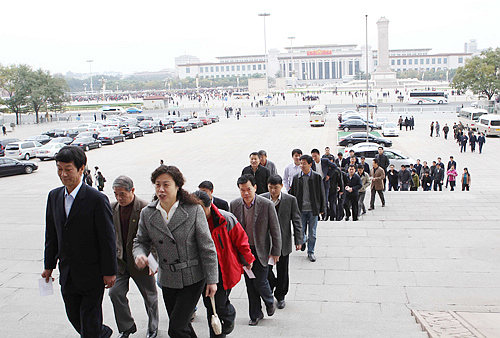|
 |
|
EXERCISING RIGHT: Voters in the Zhongnanhai Constituency walk into the Great Hall of the People to cast their ballots on November 8 (LIU WEIBING) |
Volunteers have been trained and dispatched to register voters.
"Initially I worried that people would not open their doors for me, but things turned out better than I expected," said Xu Na, a college student volunteering at Gaobeidian Township in Beijing's Chaoyang District.
Xu went from door to door to register voters. "A dozen or so young people who were hesitant about registering at first called me back soon after my visit to register," Xu said.
One of the principal difficulties of the election process is registering migrant workers. Beijing has a floating population of more than 10 million and China as a whole has more than 260 million migrants. Efforts have been made to guarantee their rights to vote and be elected.
Migrants living away from their hometowns can vote in their current place of residence after obtaining authorization from localities of their registered permanent residency. Election committees can help migrant voters contact their hometown constituencies to verify their eligibility. Migrants who voted from their current residences in previous elections can continue to do so without having to verify their eligibility once again.
According to the Electoral Law, preliminary candidates to people's congress deputies can be nominated, separately or jointly, by political parties and social groups (people's organizations) such as labor unions, women's federations and the Communist Youth League. Any group of 10 or more voters can also nominate a candidate.
There is no limit to the number of preliminary candidates. After preliminary candidates are nominated, voters in the relevant constituencies select final candidates.
For example, the Suzhou Community Constituency in Beijing's Dongcheng District has 3,263 voters. Seven preliminary candidates were nominated, but only three of them would be put on the shortlist according to election rules.
The selection of the final candidates was based on group discussions organized by the election committee. After the discussions, two preliminary candidates withdrew because they represented the same organizations as other preliminary candidates.
Then in late October, residents' representatives held a meeting to select three final candidates from the remaining five preliminary candidates.
The preliminary candidates did not attend the meeting, rather each candidate was represented by a colleague who served as a presenter. The presenters briefed the residents' representatives on the preliminary candidates' achievements and their reasons for running in the election.
After the presentations, the residents' representatives voted through a show of hands. The winners were announced after a hand count.
According to the Beijing County- and Township-Level People's Congress Election Office, 6,615 candidates were nominated from 2,257 constituencies. Among them, 10.9 percent were nominated by political parties or social groups, while the remaining 89.1 percent of candidates were nominated as they were endorsed by more than 10 voters.
Across the city, 37 percent of the candidates were women, and 6.6 percent were from ethnic minorities.
| 